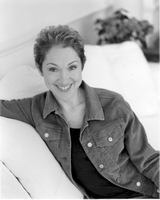Justine Picardie is the author of If the Spirit Moves You: Life and Love After Death, the novel Wish I May and My Mother’s Wedding Dress.

*From the W&A Archive: This article was originally posted in 2012*
Why do you write?
I write because it feels like I have to – as if I have no other choice but to write. I’ve always written – I was the sort of child who scribbled stories and poems almost as soon as I could write, and I made little books and magazines with my younger sister, Ruth. We’d draw the pictures ourselves, and handwrite the pages.
What other novelists do you admire?
Daphne du Maurier, Nancy Mitford, Rosamond Lehmann, the Brontës, Evelyn Waugh, F. Scott Fitzgerald. The list is endless: in fact, I admire anyone who can see a novel through, from beginning to end, without falling to pieces.
Describe the route to your first novel being published.
My first novel wasn’t my first book – I had written non-fiction before then – but I suppose I didn’t feel able to tackle a novel until after I’d written about the death of my sister, in a book called If The Spirit Moves You. I needed to tell that true story before I could write fiction. Afterwards, I wrote a novel called Wish I May, which was accepted by the same publisher.
When did you first know you would be a successful writer?
I never feel successful. I veer between feeling like a failure, and living in hope about whichever unwritten book is simmering in the back of my mind.
Do you have an agent?
My agent is Ed Victor. He has been a source of endless help, advice, support, and encouragement. He negotiates all of my book deals, and I don’t know what I’d do without him. I’m also indebted to the people who work with him – in particular, another agent called Grainne Fox, who negotiated a film deal for me.
Describe a normal working day.
I work at home, in a little study – the smallest room in the house. It’s lined with books and piled high with notebooks and sheaves of paper. I start writing in the morning, after my sons have left for school. I can only write on a computer – an Apple laptop – I seem to have lost the ability to form coherent thoughts with a pen and paper. I tend to stop writing when the boys get home, but if I’m up against a deadline, or suddenly inspired, I start again after dinner, and write until midnight, or occasionally later.
As an author, what else do you do?
The promotion of a book seems to be more and more time-consuming these days – so I do signings, interviews, and I speak at literary festivals.
What’s your advice to an aspiring novelist?
Write about the thing that really obsesses you – you need to feel possessed to get through the long, hard journey of writing a book. And don’t give up when it gets hard in the middle. The middle always feels impossible, as if you’ll never finish.
Do you ever suffer from writer’s block?
I have days when I find writing more difficult, but I try to force myself to write something – even if I have to discard all of it the next day – so that it doesn’t form a monolithic block. I also drink endless cups of tea and eat biscuits. And chocolate is always useful – I promise it to myself if I finish a chapter.
Is there a book you would have liked to have written?
I think Rebecca is a brilliant book, which is one of the reasons why it is reflected in my novel, Daphne. I also love Breakfast at Tiffany’s by Truman Capote – it manages to be so light and sparkling, at the same time as having a streak of darkness and melancholy within it.
And I Capture The Castle by Dodie Smith never fails to cheer me up, however many times I re-read it. It’s also a very good book about being a writer – it’s one of the novels that inspired me as a teenager.
Have you ever received a rejection from an agent or a publisher?
I’ve been rejected by several American publishers, although my books were eventually published in the US, by Riverhead and Bloomsbury. It felt sufficiently distant not to seem like too much of a rejection. And anyway, isn’t rejection part of the process of being a writer? You need to be able to pick yourself up from the floor, and say, well, I’m not going to give up yet.
I also think it’s worth remembering that some of the greatest writers have been rejected – just think of the Brontës, who were turned down by a number of publishers, and their first book of poetry only sold two copies. So who am I to complain?
Justine Picardie lives in London. Her novel Daphne was published by Bloomsbury in March 2008.
Find out more about titles and buy the latest releases from Justine Picardie at Bloomsbury.com.
Comments